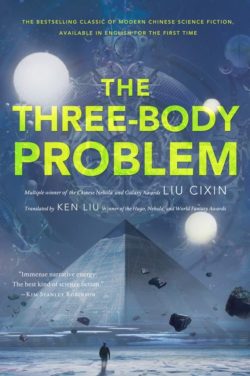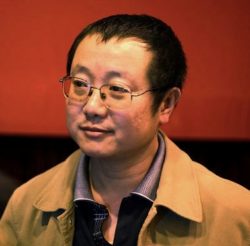Talking Translation: Ken Liu
For the second in our series of interviews with translators, we're delighted to be joined by the writer and translator Ken Liu. Ken's fiction has appeared in Asimov's, Lightspeed, Strange Horizons, and Clarkesworld, among others. He is a winner of the Nebula, Hugo, and World Fantasy awards, and his debut novel will be published by Saga Press, Simon & Schuster's new genre fiction imprint, in 2015. Ken has translated work by authors such as Chen Qiufan 陈楸帆, Hao Jingfang 郝竟芳, Xia Jia 夏笳 and Liu Cixin 刘慈欣. His translation of Liu Cixin's The Three Body Problem 三体, the first Chinese science fiction novel to be translated into English, has just been released by Tor Books, and at China's Xingyun (Nebula) Awards on November 2nd he was awarded the Special Contribution prize for his translation work.
Exploring first contact, alien intelligence, as well as complex moral and philosophical issues, the Three Body trilogy has proved hugely popular in China, helping to spark a new wave of science fiction, and bringing Liu Cixin numerous awards, as well as a loyal following of readers.
We hope you enjoy the interview, here's what Ken had to tell us;
Three Body is a huge undertaking… What drew you to this translation?
China Educational Publications Import & Export Corporation Ltd (“CEPIEC”), the holder of the English rights for the Three Body series, approached me about doing a translation in 2012. By that point, I had translated and published a number of Chinese short stories, both literary and genre, including works by Liu Cixin. I think they were looking for someone who could not only do the translation but was also part of the Anglo-America genre community so that the translator could help promote the book.
I was a bit hesitant about taking on the project at first. I liked the Three Body books, but doing the translation would have meant putting my own novel on hold. However, I felt that I could offer the translation my unique skills as a genre author in addition to my cultural and linguistic knowledge, and I wanted to do what I could to give the book the best chance of succeeding in Anglophone markets. And so I agreed to translate the first volume, with other translators taking on the remaining two volumes. (- Joel Martinsen is the translator of the forthcoming second novel.)
As things played out, I became the translator for both the first and final volumes of the series, and it was a lot more work than I had anticipated. The final volume is especially complex, and I basically put my writing career on pause for the duration. I do think the effort was worth it, as I learned a great deal about the art of translation as well as writing fiction in general. But I think I’ll need a break now to recover and to get back to my own fiction.

This is the first time that a Chinese hard SF novel has been translated into English; was it a difficult process to find a publisher?
I wasn’t directly involved in CEPIEC’s process of finding a North American publishing partner, though my agent at the time and I did offer them advice and made some connections for them. I was really glad when Tor Books ended up as the publisher of the English edition, especially as that meant I got to work with Liz Gorinsky, one of the best long-form editors in the business. It was a pleasure to receive editorial suggestions from her, and I think she helped the book in a thousand ways big and small.
I also ended up doing a fair bit of publicity work for the book, translating a short story that Liu Cixin adapted from one of the episodes in the book as well as helping to pitch, translate, and place essays by Liu Cixin in various venues frequented by genre readers. I introduced the book to some prominent Anglophone writers in the field, and the responses have been very gratifying. David Brin, for example, has been instrumental in helping me to promote the book.
Can you talk a bit about the particular issues that arise when translating SF work that uses invented or very complex technological terms?
That actually turned out to be one of the least difficult aspects of translating a work like this. Since science jargon in Chinese is largely derived from English, the process was fairly painless. I also asked several physicists to vet my translation to be sure I got the science as well as the terminology right, and that worked out well. It’s good when you have smart friends who can save you from embarrassing yourself! (John Chu, in particular, was incredibly generous with his time and did a lot to help me get the technical bits right.)
Bridging differences in literary style turned out to be harder. There are things that Chinese readers are used to in genre literature (extensive use of fictional excerpts, long technical lists, switching POV mid-scene, etc.) that are not seen as often in Anglophone science fiction. I had to strike a balance between “rewriting” some of these to accommodate the preferences of the target readers and preserving a sense of the original’s unique style. Liz and I discussed some of these choices extensively, and I hope the result satisfies.
How closely did you work with Liu Cixin during the translation?

Quite a lot! I’d say that the process of translation made us into friends. That was great because I was a fan already. As a writer and a translator, I understand the importance of respecting the author’s words and vision, and I consulted him over any non-trivial change to the text. Liu Cixin was really wonderful to work with: patient, generous, knowledgeable, and insightful. We came up with many solutions together.
How has reading and translating Chinese SF affected your own writing? And conversely, how does your own writing affect your experience of translation?
That’s hard to say. I think I’ve learned a great deal about language and storytelling from all the authors I’ve translated, and I’m sure echoes of their influence show up in my own work—hopefully in positive ways. In some ways, translating is about analysing the voice of another author to find out how it works and then recreating it in another language and another culture. The experience is difficult but very rewarding.
Thank you so much for your time!
Thanks for having me! I hope you and your readers enjoy The Three-Body Problem and its sequels.
You can find out more about Ken and read some of his stories and translations online here.
Liu Cixin is interviewed by writer John Scalzi here, and tor.com has a fascinating article by Liu himself on The Three-Body Problem and Chinese science fiction.
